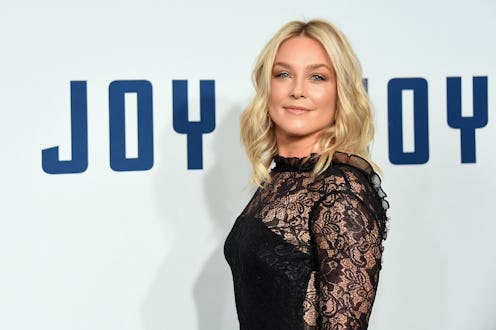Entertainment
Elisabeth Röhm On Working With J. Law In 'Joy'
Joy Mangano, queen regent of the Home Shopping Network and subject of the new movie Joy , made the first prototype of her now-iconic Miracle Mop in 1990. During the following decade, Mangano led her business, Ingenious Designs, LLC, to enormous financial success, eventually selling it to HSN in 1999. Yet the inventor's biography, while impressive, isn't the main takeaway of David O. Russell's new film, which stars Jennifer Lawrence as the Long Island-based entrepreneur; instead, it's the movie's feminism that stands out the most. The film emphasizes female empowerment, an ethos that Russell brought to his set as well as to the screen, according to Elisabeth Röhm, who plays Joy's fictional sister Peggy.
"Whether you’re 22 or 52 or 82, there’s something that connects all of us, and it’s inner resilience and not taking no for an answer," Röhm says. "We’re all motivated to do better and be proud of our accomplishments in life."
For Joy, in theaters Dec. 25, Röhm is part of a cast that includes Lawrence, Isabella Rosselini, OITNB's Dascha Polanco, Virginia Madsen, and Diane Ladd. Prior to this film, Röhm says she had never worked with so many female co-stars across all ages and experiences, many of whom had accomplished incredible things in their careers. Says the star, "Being around a significant group of women who have done just that, you know, it's incredible."
Especially Lawrence. Röhm's esteem for her younger costar comes through in her voice as she discusses their scenes together. "We're not going to the spa together," she says in a deadpan, "but I love her very much and have the greatest respect and admiration for her."
Röhm had previously worked with Lawrence, as well as Joyco-stars Robert De Niro and Bradley Cooper plus director Russell, in the 2013 Oscar-nominated comedy American Hustle. The repetition isn't a surprise; Russell is known for his stable of preferred actors. Silver Linings Playbook also featured Cooper, De Niro, and Lawrence, the latter of whom won the Best Actress Oscar for her role. In short, it's a winning team, one many actors would undoubtedly hope to join — including Röhm. Russell added Peggy to the Joy screenplay fairly late in the production process, and reached out to Röhm to play the part. "When David O. Russell calls you," she says, "You can’t believe your luck... It’s not really choice."
Joy offers more dramatically intense scenes for Röhm and Lawrence than were afforded them in American Hustle. Warm as their relationship might be off screen, on screen, Joy and Peggy have a contentious sisterhood. Peggy "wants to take away the joy and the possibilities of this dream of her sister’s," Röhm says. Her character feels inconsequential and under-appreciated beside her superstar entrepreneur sister, who happens to also be blonde, beautiful, and, you know, played by Jennifer Lawrence. "It takes away from what she feels is her own value. Unfortunately, most people have really faced a person like Peggy — if not more than one," Röhm adds.
While playing the part, Röhm found empathy for Peggy, particularly in scenes like the one in which Joy chastises her father and sister for purporting to hold any power in the Miracle Mop business. Despite Peggy's best efforts to closely ally herself with their father, she still perceives Joy as the more beloved daughter, a sad aspect of her personality that Röhm honed in on. Yet the actress notes that she identifies with Joy, too; as the single mother of a seven-year-old daughter and as a woman who built her acting career from the ground up, Röhm says Joy "represents what it's really like to be an entrepreneurial-spirited woman."
Röhm cites a scene when Lawrence's character, frustrated with the stagnancy in her life, says, "I don't want to become like our family." That instance, the actress says, represents that drive to "do better."
The film's cameo appearances by pop culture icons like Joan Rivers (played by daughter Melissa) just reinforce Joy's themes of hard work, determination, and success, especially in regards to the particular struggle faced by women in business. Röhm says that in addition to Mangano and the film's original screenwriter Annie Mumolo, many real-life women helped give the film its point-of-view.
"A lot of the things that happen in the movie are inspired by other women who have inspired David — daring women that have impressed him throughout his life," she says. Because of this and so much else, Joy, Röhm says, is about what it means to be a woman in every sense: "A matriarch; a boss; a mother; a wife and divorced; the daughter of dysfunction and love." In other words, when it comes to feminism, Joy definitely gets it right.
Image: 20th Century Fox; Giphy
